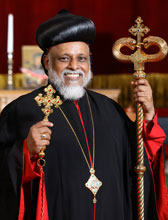Mar Gregorios Orthodox Christian Students Movement (MGOCSM)
Mar Gregorios Orthodox Christian Student Movement of India (MGOCSM), the oldest student Christian organization in Asia, is the student wing of the Malankara Orthodox Syrian Church. The students and senior leaders of our Church who were residing in Madras in the early part of the last century felt the need for an organization to bring together our students in various colleges and high schools with a view to deepening their spiritual life and to create in them a livelier sense of fellowship. They founded the Syrian Student conference in 1907 and the first conference was convened on 1st January 1908 at Tiruvalla. The Syrian Student Conference, the parent organization, assumed its present name MGOCSM in 1960. It is the oldest Christian Student Organization in India with the motto – Worship Study Service.
MGOCSM have been maintaining inter-disciplinary contacts in the academic field for a long time by the formation of its wings. They are the High School, Higher Secondary, College students’ wings, University, Higher Secondary, High School teachers’ associations, Medical Auxiliary, Technical Auxiliary, Missionary forum, Literary forum, Publication Wing, Music Wing, Legal Forum etc. Student Centres at Kottayam, Tiruvananthapuram, Kothamangalam, Alwaye Davengere (Karnataka) stand as fitting monuments to the continuous and tireless efforts of the Movement during the past years, Each Student Centre provides hostel facilities in addition to chapel, auditorium, reading room and guest rooms. Mar Theophilus Study Centre in Kottayam is available for seminars, study classes etc.
For the students of our Church, who are geographically isolated and for those who are not able to be in fellowship with other MGOCSM members due to different reasons, the central office has given a formation to MGOCSM E-Unit which is an opportunity for association and fraternity through the Internet.
The Movement has three main objectives:
- to deepen the spiritual life of its members.
- to prepare them to be responsible citizens in the Church and Society
- to encourage them to commit themselves for sacrificial service in the Church and Society
Above all, the greatest contribution the Movement has made to the Church is that it has prepared and provided able and outstanding leaders for her service from time to time. Crossing the golden mark of 100 years in history the Movement looks forward to venture into new areas and to establish more centres for effective work. Let us thank the Almighty for His blessings on the Movement and seek the intercession of our Patron Saints Mar Gregorios and Mar Dionysius.
PATRON: His Holiness Baselios Marthoma Mathews III, Catholicos and the Malankara Metropolitan
PRESIDENT: H.G. Dr. Abraham Mar Seraphim
VICE PRESIDENT: H.G. Dr. Zacharias Mar Aprem
General Secretary: Rev. Fr. Jeeson P. Wilson
Office Bearers of MGOCSM Delhi Diocese(2024-25)
| H. G. Dr. Youhanon Mar Demetrios, Metropolitan | President | |
| Rev. Fr. Abin P. Jacob | Vice President | 9540265030 |
| Mr. Tinu A. Thomas, Sarita Vihar | General Secretary | 97188 37379 |
| Mr. Jobin John, Janakpuri | Joint Secretary, Delhi-NCR | 9911813293 |
| Ms. Neha Susan Thomas, Chandigarh | Joint Secretary, Outside NCR | 88722 95532 |
| Ms. Jeena Abraham, Ghaziabad | Treasurer | 8447082492 |
| Ms. Mahima Mariam John, Rohini | Worship Secretary | |
| Ms. Rini Varghese, Janakpuri | Study Secretary | |
| Mr. Rijo V. Thomas, Janakpuri | Service Secretary | |
| Ms. Divya John, Ghaziabad | Gregorian Voice Coordinator | |
| Mr. Allen Chacko Thomas, Janakpuri | Cultural Secretary | |
| Ms. Aksa Mary Saji, Ghaziabad | Media & Publication Secretary | |
| Ms. Blessy K Abraham, Sarita Vihar | Literary Forum Secretary | |
| Ms. Febha Mariam Panicker, Janakpuri | Internal Auditor |
Prayatna Team
| Fr. Abin P. Jacob | Vice President | 9540265030 |
| Ms. Jinsa Elizabeth George, Chandigarh | Chief Editor | 8360258357 |
| Ms. Aleena Sara Samuel, Hauz Khas | Sub Editor | |
| Mr. Steffin C. Saji, Dilshad Garden | Member (Logistics) | |
| Ms. Merlin Joseph, Hauz Khas | Member | |
| Mr. Shijo Mammen K. Ms. Ananya Elizabeth Varghese | Nominated Members |
| Nominated Members for MGOCSM Diocesan Assembly: |
| Mr. Shijo Mammen K, Dilshad Garden |
| Ms. Ananya Elizabeth Varghese, Noida |



